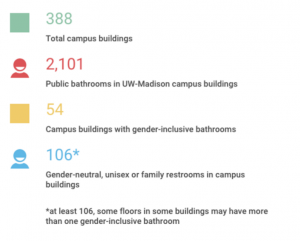Proposed bathroom bill draws large audience at public hearing
Posted by millis2 on Monday, December 14, 2015 · Leave a Comment
by Sofi LaLonde
A hearing for a bill that would ban transgender students in Wisconsin from using bathrooms that match their gender identity brought over 100 people to the Capitol in late November.
If passed, Wisconsin would be the first state in the nation to ban transgender students from using bathrooms and locker rooms of their gender identity.
Assembly Bill 469 would require school boards to designate bathrooms and locker rooms by gender and to make special accommodations, such as using single stall bathrooms, for transgender students in public school buildings.
Students would have to use bathrooms and locker rooms that match their biological sex, even if their sex differs from their gender identity. The bill defines sex as determined by chromosomes and biological sexual anatomy.
Gender is not the same as sex. The American Psychological Association defines gender as the attitudes, feelings and behaviors that a culture associates with biological sex, and person’s gender identity can be different from their sexual anatomy.
The bill also states that parents may file complaints against the school if they feel their student’s privacy has been violated. The district has 30 days to investigate, and if not satisfied, parents may seek further legal action.
Supporters of the bill say that allowing transgender students to use bathrooms that differ from their biological sex infringes on the privacy of other students.
In an article from the Cap Times, Julaine Appling of Wisconsin Family Action said private facilities are not places to “seek validation for a cause.”
“(This bill is) a social experiment that borders on child exploitation,” Appling said.
Rep. Jesse Kremer, R-Kewaskum, and Sen. Steve Nass, R-Whitewater, proposed the bill to protect students’ rights to privacy.
The bill would provide a “dignified learning environment” for all students, Kremer said in an article in the Wisconsin State Journal.
However, opponents of the bill disagree.
Dr. Cabell Gathman, an associate lecturer of Intro to LGBTQ Studies at the University of Wisconsin-Madison, says that policing students’ bathroom use could lead to classmates and teachers normalizing negative treatment of transgender students.
“They’re basically saying these students are not who they say they are, and that they can’t use the bathroom like all the other kids,” Gathman said. “That’s not dignity.”
Gathman says this bill would be extremely damaging to students, especially in terms of mental health issues for transgender individuals.
According to the 2011 National Transgender Discrimination Survey, which surveyed 6,450 transgender and gender non-conforming participants around the country, 78 percent of respondents experienced harassment in K-12 educational settings and 41 percent of respondents attempted suicide.
Fifteen percent of respondents reported that they left K-12 education or higher education because of severe harassment. These experiences in educational settings can lead to worse health and lower incomes later in life.
Gathman also says there is no evidence of transgender people acting as aggressors in bathrooms.
“This is what they say when they want to make rules that prevent trans people from using bathrooms, that they’re concerned about predators. It’s already illegal to commit abuse or assault in a public restroom or anywhere else on a school property,” Gathman said.
A Look At UW-Madison
UW-Madison already has many resources and policies for transgender students. The LGBTQ Campus Center provides discussion groups for trans students and guides students to other resources such as name changes in campus records and health insurance questions.
The student health insurance plan, SHIP, provided by University Health Services covers hormonal therapy and gender affirming surgery. University Health Services also provides mental health counseling and services.
UW-Madison has several gender neutral bathrooms throughout campus, but some see them as inadequate.
“These bathrooms are few and far between, says Kadin Henningsen, a teaching assistant for Intro to LGBTQ studies. “Furthermore, athletic facilities currently have no access to gender neutral changing rooms or showers.”
“By separating trans and gender-queer students from their peers, we teach non-trans/gender-queer students to fear others who are different from them,” Henningsen said.
Henningsen also says that to improve inclusivity on campus, more experiences of trans people could be incorporated into class syllabi across subjects and not just limited to classes in Gender & Women’s studies courses.
The environment of inclusivity at UW-Madison differs for each trans individual.
“It’s hard to say what the overall environment is at UW-Madison, but in my own experience I’ve felt relatively welcome and accepted at UW,” Henningsen said.
Henningsen is a transgender man.
“I do know, however, that other trans people on campus have had difficult and painful experiences, such as being called the wrong name or referred to with the wrong pronouns.”
In terms of the bill, Henningsen fears that it is “only a matter of time” before this bill covers not only schools but also all public bathrooms in Wisconsin.
Henningsen says also this presents several problems for people who care for people with disabilities of a different gender who need assistance in the bathroom or for parents caring for young children.
The bill has not yet been put to a vote. The bill has eight co-sponsors in the Assembly and three in the senate, with one lobbyist group registered in support. Nine lobbyist groups are registered against the bill.
For a map of unisex bathrooms see this map: UW Unisex Bathrooms
Category: Madison Problems, Social Justice · Tags: Gender, Government, Inequality, Sofi LaLonde
The arc of the moral universe is long, but it bends toward justice.
-Martin Luther King Jr.
 The Arc: Visions of justice
The Arc: Visions of justice
